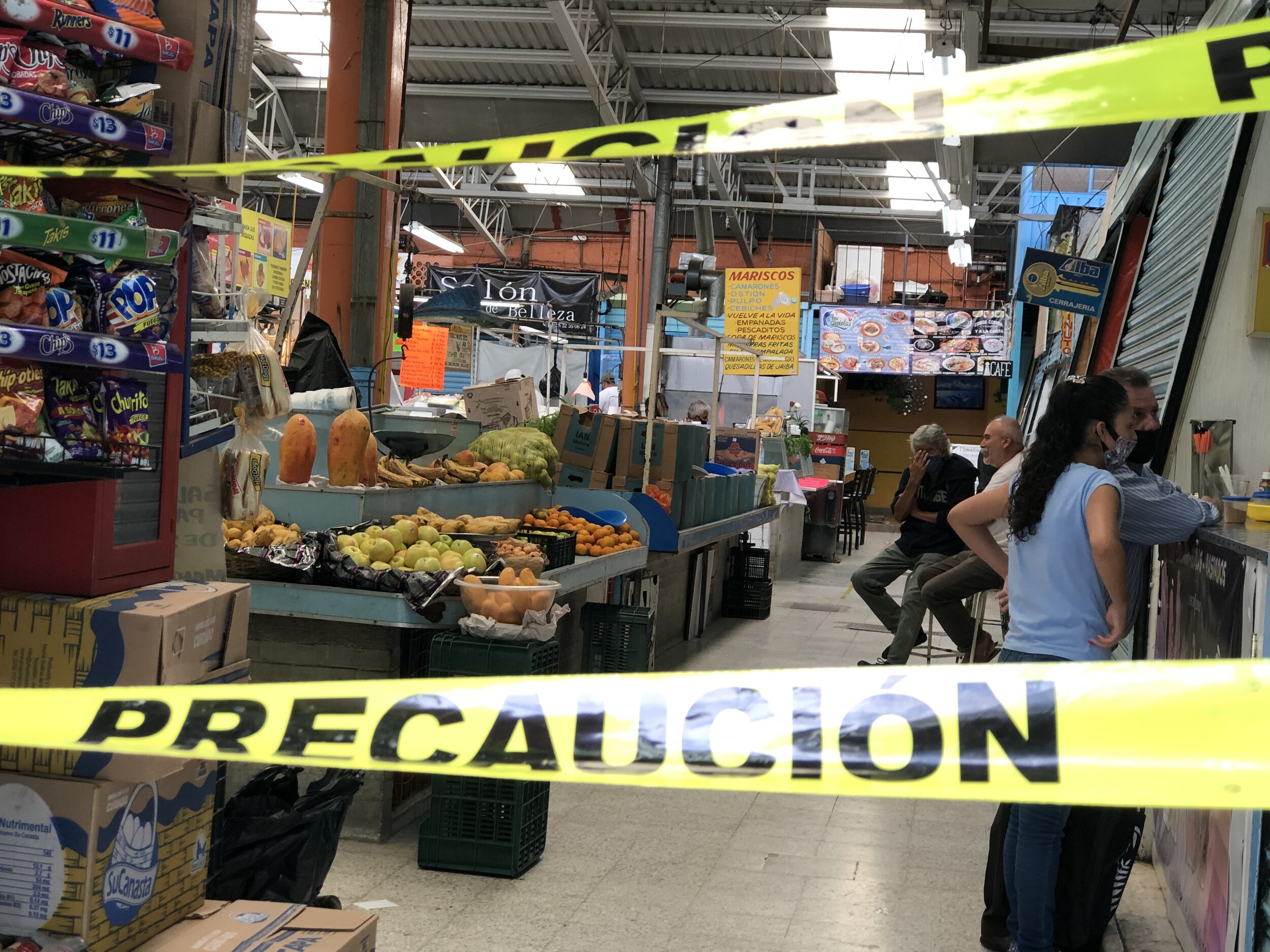Working Through The Pandemic
Vendors sell fresh vegetables each week to residents of the Mexico City neighborhood of Colonia Narvarte. They have worked continuously during the coronavirus pandemic. Photo courtesy of Jimmy Hernandez
Half of Mexico’s workforce toils in the “informal sector.” In a dangerous pandemic, day-to-day work is riskier than ever.
Video by Franc G. Contreras
By Vicki Adame
Each day before the COVID-19 pandemic hit Mexico, Gerardo Reyes would set up his food stand on a street in Capulhuac, just outside the city of Toluca, a bustling commercial hub west of Mexico City.
On his menu was an array of tacos de guisado — chicken or pork rinds in green and red sauces, or chopped steak in a chile and cactus sauce. A rich aroma would cover the street and lure a steady stream of regulars. Customers routinely took time out to enjoy their meals at a long, folding table he set up next to his impromptu kitchen.
But in mid-March, everything changed. Across Mexico, businesses began to close in an effort to protect employees and slow the spread of the virus. The nation, with a population of 129 million, began reporting more and more coronavirus infections and an accelerating daily death count.
Today Mexico is among Latin America’s hardest-hit countries. Mexican government officials report the nation’s case count is approaching 400,000, with well over 40,000 deaths -- one of the world’s highest ratios of fatalities to cases. There is concern that deaths have been undercounted: In May Mexico’s population agency listed 19,000 more deaths than health officials.
No people traffic
Initially, Reyes kept his food stand open. He put in play the safety measures experts had called for, like masks for his workers and insisting on safe distancing. Soon, though, he realized customers were no longer venturing out on city streets usually teeming with pedestrians.
The quiet was odd for Toluca, an urban center in the state of Mexico, which surrounds Mexico’s Federal District. The crowded metropolitan region, known as the Valley of Mexico, has a population of at least 21 million.
Reyes eventually closed down his stand. And for almost four months he did not work.
Gerardo Reyes at his food stand in Capulhuac, outside of Toluca in central Mexico. Photo Courtesy of Gerardo Reyes
Food stalls like Reyes’ -- they’re called puestos — are common throughout Mexico. The people who run them earn their living day-to-day from the meals they prepare and sell on-site. The goal each day is making enough to cover basic needs and put food on their own tables.
But as the number of coronavirus cases began to climb, the Mexican government stepped in on April 1 and shut down everything. Vendedores ambulantes -- street vendors -- like Reyes were suddenly without a source of income.
Instead of a puesto, Reyes did everything possible to continue cooking and selling meals. He tried to take orders by WhatsApp and made home deliveries.
“But it just didn’t take off. Most people already have their regular vendors and aren’t going to start with someone new,” Reyes said. “Many of us just didn’t have the opportunity.”
The big peso freeze
The impact of the shutdown has been wide-ranging. Economic estimates say almost half of Mexico’s working-age population is in the informal sector -- they pay no income taxes and they don’t qualify for employment-related benefits. There’s no paid leave for them; they must work to earn a day’s wage.
It’s expected to get worse: A U.S. Congressional Research Service report said economies in Latin America will fall into a deep recession this year. Also, millions of families in Mexico depend on migrant remittances from the United States to make ends meet. As the U.S. economy continues to decline this summer, the flow of remittances has slowed. Immigrants have lost work in places like restaurants and hotels.
In Mexico, employees of larger corporations and retail outlets have been idle at least since April 1. Old Navy closed its Mexico stores on March 19. An email sent to customers announced that outlets would be closed at least two weeks and that employees would receive salaries and benefits during that time.
Grupo Carso, owned by billionaire Carlos Slim Helu, went even further. In March, the company said that in the event of a complete, government-ordered shutdown of all nonessential businesses, its employees would continue to receive their salaries. Carso is one of Mexico’s biggest private employers. Among its businesses are retail outlets Sears and Sanborns. Employees of its digital news site, Uno TV, have been mostly working from home.
But not all big companies took the same safety measures.
Ricardo Salinas Pliego, owner of Grupo Salinas, which includes the Azteca television, retail, and banking businesses, stood out as an opponent of the government’s shutdown orders.
In a Twitter post, Salinas Pliego said, “We know that fear is a very bad counselor; instead, reason tells us that life must go on. The decision to slow down a country does not produce anything positive, especially when it is based on fear, on a false premise: that COVID-19 means death.”
A look inside a downtown Mexico City market. Photo courtesy of Franc Contreras
No bailouts
Even as most companies were sending employees home to work remotely, that simply wasn’t an option for those who viven al dia -- live and work day-to-day. They defied stay-at-home orders. They set up food stands and consumer-goods stalls along neighborhood streets, hoping to make enough to cover the day’s essentials. These street vendors were left on their own. There was no government help, no small-business bailouts or loans, Reyes said.
The impact of not working for almost four months went beyond the economic.
The effects were both physical and psychological, Reyes said. “It was a very challenging situation. It wasn’t easy to accept the fact that we’re not working anymore. It wasn’t easy to get out of an established routine. But it cost more than we thought. It wasn’t just the economy.”
Reyes belongs to a merchants group that tried to organize meetings with local governmental officials, but that led to little direct aid for street vendors.
“They told us that yes, we would be working, but we could only be in specific locations — but only those who have licenses,” Reyes said.
Many street vendors work without licenses, and the need for such permits has never really stopped people from setting up their puestos.
“The reality is, there are many of us who are street vendors. And for us, it’s been a struggle to find a worksite,” Reyes said.
Reyes was one of the lucky ones. In late June he found a place and reopened his stand.
He no longer has the tables or plastic stools that invite people to sit and eat. And although the orders are to-go only, many people, he said, will simply stand there and quietly eat their tacos de guisado.
“You do what you can,” Reyes said, putting a positive spin on a bleak situation. “And honestly, with a lot of love. I love what I do.”
---
Vicki Adame is an award-winning multimedia journalist who has focused on the lives and struggles of immigrants and communities of color. Her work has appeared in CTLatinoNews.com, Latino Rebels and Latino USA, among other publications, and she has translated articles for El Faro in El Salvador. Since 2018 she has split her time between Mexico City and California.
Franc Contreras is a freelance journalist based in Mexico City. In the last three decades he has covered Latin America for China Global Television Network, Al Jazeera English, and the BBC World Service Radio. In the early 1990s, he was an Assistant Producer for NPR’s All Things Considered, based in Washington D.C. He was also part of the team that created Latino USA in Austin, Texas.
Jaime “Jimmy” Hernandez is an Emmy-award winning videographer who began his career in 1989 as a sound recordist for ABC News. Hernandez’s work has appeared on many global television news and documentary channels including Discovery, the History Channel, Telemundo and Univision. He is based in Mexico City.









